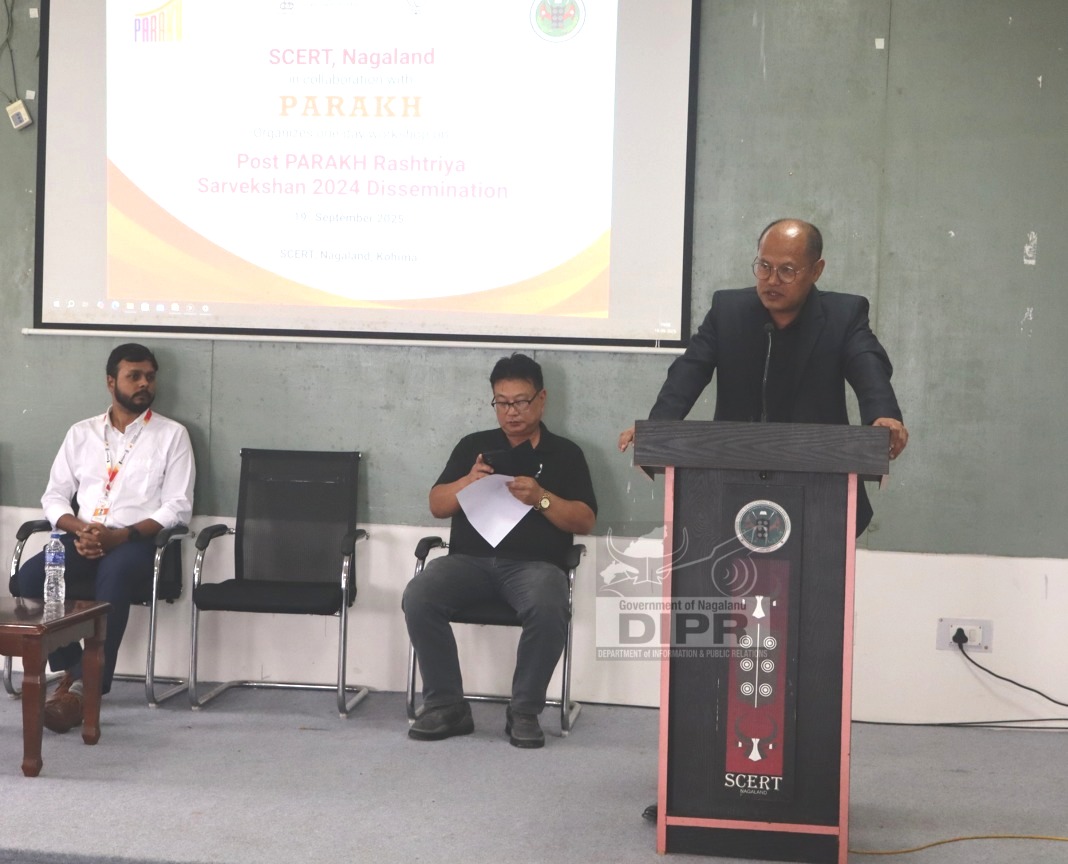FRIDAY, SEPTEMBER 19, 2025
- Home
- SCERT Nagaland hosts workshop on post-PRS 2024
SCERT Nagaland hosts workshop on post-PRS 2024
State Council of Educational Research & Training organises workshop on post-PARAKH Rashtriya Sarvekshan (PRS) 2024 dissemination.
Share

DIMAPUR — The State Council of Educational Research & Training (SCERT), in collaboration with PARAKH, organised a one-day workshop on post-PARAKH Rashtriya Sarvekshan (PRS) 2024 dissemination at SIEMAT Hall, SCERT, Kohima, on Friday.
In his address, Additional Director of SCERT Nagaland, T Lima Longkumer, emphasised that education is the foundation of progress, noting that the survey report provides invaluable insights into learning levels, teaching practices, school environments, and the challenges that shape the future of children, a DIPR report stated.
Longkumer highlighted that the survey assessed students of grades 3, 6, and 9 in the areas of language, mathematics, science, and social sciences, while also examining teacher preparedness, infrastructure, and community participation.
Also read: Seyochung Area Students’ Union clarifies no Seyochung Area Sangtam Students’ Union exists
He stated that the results showed both the strengths and areas that require greater effort.
For instance, students in Nagaland have shown encouraging performance in language and certain social science competencies, but learning gaps remain in mathematics and science, particularly at the middle stage.
The report also underscored the importance of stronger skill education, enhanced teacher professional development, greater integration of technology, inclusive education practices, and a safe and supportive school environment.
The official remarked that these findings are not mere statistics but a call to action, reminding everyone of the shared responsibility to ensure that every child in Nagaland receives quality education that nurtures their potential, builds confidence, and prepares them for the future.
Longkumer also acknowledged the tireless efforts of teachers, master trainers, school leaders, officials, and community stakeholders whose dedication made the survey possible.
Encouraging collective effort, he urged that the insights from the survey be translated into concrete actions.
“Together, we can bridge learning gaps, strengthen our education system, and make schools places where every learner thrives,” he said.
Concluding his remarks, Longkumer called upon all stakeholders to work in a united manner towards realising the vision of the National Education Policy 2020 - an inclusive, equitable, and competency-based education system for the children of Nagaland.
Head and CEO of PARAKH, NCERT, Prof. Indrani Bhaduri, in her keynote address, described the PARAKH Rashtriya Sarvekshan (PRS) as a robust national large-scale survey designed to generate evidence on students’ learning competencies aligned with national standards under NEP 2020.
She explained that PRS goes beyond national and state averages by offering granular district-level data, enabling states to prepare targeted district action plans embedded within the competency-based assessment framework and implemented through the holistic progress card.
Prof. Bhaduri highlighted that the survey, conducted in grades 3, 6, and 9, is complemented by contextual data from student, teacher, and school questionnaires, resulting in a comprehensive dashboard of indicators.
These include district-level performance in key competencies, intra-district variations, and links between learning outcomes and contextual drivers such as teacher preparedness, instructional practices, resources, and student engagement. The findings, she said, uncovered learning gaps and disparities across districts and subgroups by gender, social category, school type, and locations, thereby helping states identify districts that require greater support.
Prof. Bhaduri emphasised that PRS establishes a baseline for monitoring progress in future cycles, ensuring that evidence translates into concrete action at the grassroots.
She urged states to use the insights for equitable resource allocation, focused remediation strategies, and district-specific interventions, thereby strengthening both equity and quality in school education across India.
She further noted that PRS represents a transformative shift in how learning is assessed, supported, and improved at both the classroom and system levels.
This integration, she said, holds the promise of achieving equitable and high-quality learning outcomes across India’s diverse educational landscape.

